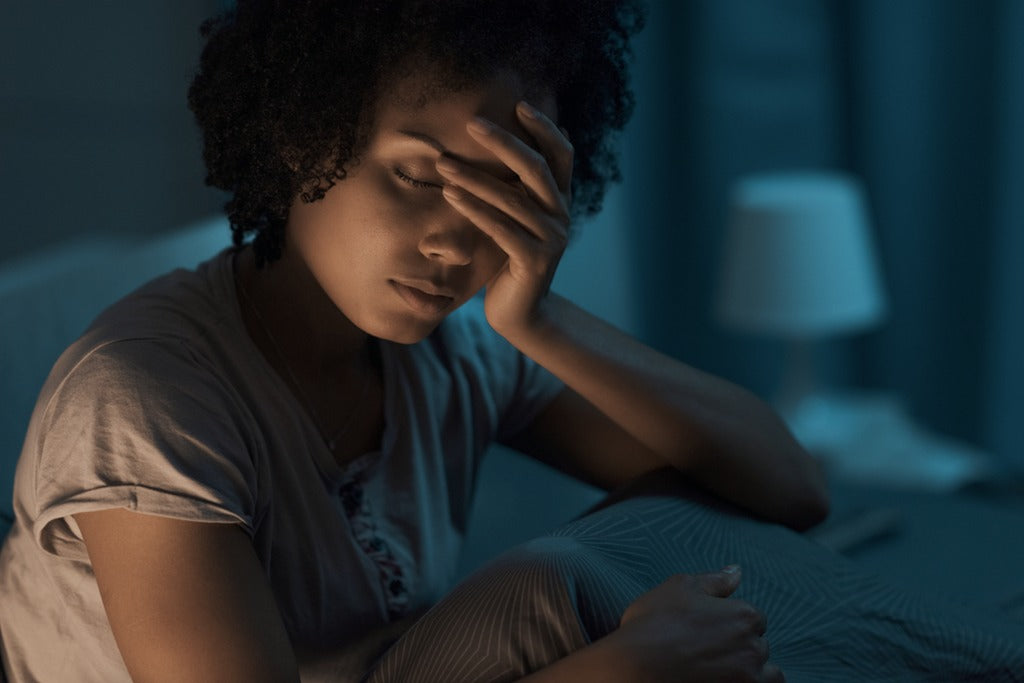
The anti-aging benefits of sleep are so profound, anyone who's concerned about feeling and looking as healthy and young as possible can't deny the statistics on sleep and aging.
Here are a few facts for you if you're wondering whether your late nights are taking a toll on your skin and your body.
More Sleep = Less Wrinkles.
Your skin makes new collagen when you sleep, which prevents sagging.
It's all your body's natural process and an integral part of the repair process - that's your circadian rhythm at work. Boosted collagen production means skin is plumper and less likely to wrinkle. If you're someone who's only getting 5 hours of sleep a night, this state of 'repair-depravation' can lead to twice as many fine lines as sleeping an extra two hours.

A Complexion That Truly Glows.
Have you ever looked at someone and thought, "Wow, their skin is glowing?" That can be from topical oil-based serums sure, but most often its a glow from within which means when you're sleeping more the blood flow to your facial skin is greater producing that rosy-cheek look. When you are sleep deprived your skin too is deprived of vital nutrients from the blood and gives you that dry, ashen dull appearance.
No More Puffy, Tired Eyes.
Yep. A late night out with perhaps one too many glasses of your favorite wine with friends, not enough H2O and (let's be candid here) crashing without a good sleep hygiene plan in place is going to cost you valuable shuteye and leave you waking with dry, puffy eye.
Plenty of rest can definitely reduce dark circles too - even if you're someone who has a genetic propensity for under eye circles, a lack of sleep will only make that condition amplified. Our Un-Liner Wrinkle Reducer & Brightener is fabulous for this.
A Rested You is a Smiley You.
What does that mean exactly? Well, when you are sleep deprived that low blood flow actually can cause your face and mouth to droop giving you a sad, weighed down appearance.
When you’re tired, your facial expressions change in subtle and consistent ways. We tend to furrow and frown more. When people say to you, ‘You look tired are you feeling OK?,’ it can be because of these expressions.
Red, swollen eyes, dark circles, sagging eyelids, and sallow skin can also signal to others that you’re exhausted. People who don't get enough rest are also seen as less healthy than when they’re rested.
Well now that you're sufficiently bummed out, let us share some really simple ways you can turn your sleep-deprived frown upside down and start to look and feel your absolutely best.
We really love these tips from the popular meditation app, Headspace.
1. Set a consistent sleep schedule. Topping sleep specialists’ lists — and hardest for many people — is keeping a regular sleep schedule. This means going to bed and waking up at the same time every day, give or take 20 minutes, including weekends. Creating a sleep framework sets the body’s internal clock to expect to rest at a certain time each day. Contrary to what might seem logical, even if you haven’t slept well during the night, it’s best not to allow yourself to sleep in later the next morning. Getting up at your usual time will heighten your “sleep drive,” and help you sleep better the following night.

2. Create a relaxing bedtime/pre-bedtime routine. Whether it’s a warm bath, reading a book, listening to nature sounds, sleep music, meditation and prayer mantras or any relaxing activity about an hour before bed helps creates a smoother transition between wakefulness and sleep. FYI, this does not include catching up on the latest episode of your favorite Netflix series in bed.
3. Keep your room cool and comfortable. The ideal room for sleeping is cool, quiet, and dark. Studies show that a bedroom temperature of around 65 degrees Fahrenheit is most conducive for healthy, restful sleep. Your mattress and pillows should feel really comfy, allowing your body to settle down and relax.
4. Dim the lights after dark. Getting enough natural light during the day is important for keeping your circadian rhythm, or body clock, on a healthy sleep-wake cycle. Bright light from lamps and electronics at night, however, can mess that cycle up, making it harder to fall asleep. That’s because light, especially blue light from your laptop or cell phone, interferes with the release of melatonin, a hormone that tells our body that it’s time to wind down. Think about dimming the lights at home after you finish dinner, or once you get into bed. And, of course …
5. Unplug an hour before bed. You’ve probably heard this a million times, but it’s worth repeating: Screens and sleep are incompatible. Keeping screen use to a minimum, at least an hour before bed, is essential for sound sleep. Besides the light disrupting your body clock, games, videos, work emails, and social feeds all conspire to keep your mind active — and keep you awake way later than you should be. (See point #2 for our reminder).
Make it a habit to sleep with your phone out of reach, if possible. Keeping it off your night table means it will be out of reach, especially when you can’t sleep. Another idea is to keep it face-down on your nightstand so that you will not see it light up in the night.
If you need help waking up, consider an old-fashioned alarm clock, they're retro chic and when that alarm goes off there's no 'snooze' to tap!
6. Steer clear of stimulants late in the day. Who doesn’t love a good cup of coffee as a late-afternoon pick-me-up? Caffeine, however, is a stimulant. If you’re having trouble sleeping, you’ll want to avoid beverages and foods that contain caffeine — coffee, non-herbal tea, colas, even chocolate — at least 6 hours prior to bedtime.
7. Nix the nightcaps. Seriously, who of us doesn't know this by now? Even a single glass of wine close to bedtime can impact your sleep. Though alcohol initially will make you feel drowsy, ultimately it can interfere with the quality of your sleep. Drinking can also lead to lighter, more restless sleep, diminishing sleep depth and quality, so you’re more likely to wake up feeling fatigued.
8. Prop yourself up a bit with an extra pillow. This is 100% skincare related as elevating your head helps with proper blood flow aiding in reducing saggy, sallow and dull looking skin.
9. Get regular exercise. Duh. We all know that regular exercise not only contributes to a host of body-positive good stuff but it has been proven to have an immense effect on the quality of our sleep.
If you're someone who's having a bit of trouble with your sleep, you may want to get your workout in earlier in the day, or at least 3 hours before bedtime. Exercise stimulates your body to produce the stress hormone cortisol that keeps your brain alert. Which is perfectly normal and fine, unless you’re trying to fall asleep.

10. Only use your bed for sleep and sex. It's so important to use your bedroom just for sleep (and sex of course). That means no TV (ahem, that no Netflix tip we told you about...) no online shopping, so swiping Instagram cat memes or TikTok trends, no late-night chats with your bestie, partner or spouse. Go to bed means you're telling your body and your mind its time to rest, restore and heal.
Amazing. All we need to do is follow a few really simple tips and we can go from bleary-eyed zombies to fresh-as-a-daisy powerhouses with just a few more hours sleep.
Oh, we almost forgot the most important thing to remember - adding our latest and greatest innovation, our Beauty Sleep by Frankie.
It’s only during deep sleep that stress hormone levels drop low enough to trigger a release of human growth hormone. This natural cycle allows healthy cellular division, improves immune function, and replenishes your skin’s lost collagen. Our dual-action blend promote stage 4, REM sleep while providing your body proper nutrition when you need it the most. Fall asleep faster, stay asleep longer, wake-up feeling and looking your best.

Comments (0)
Back to Blog